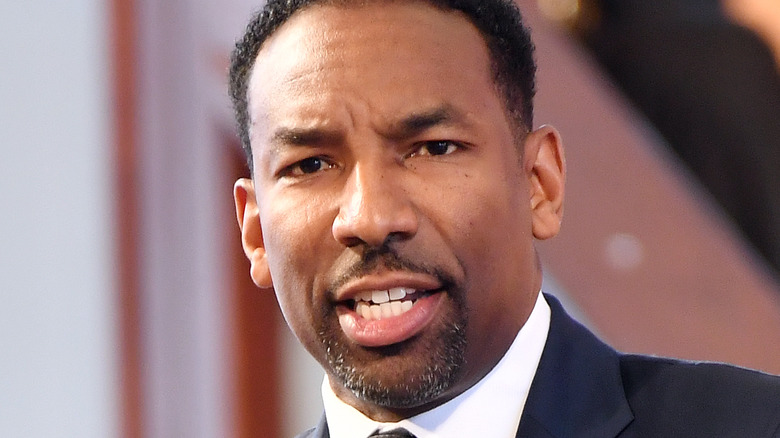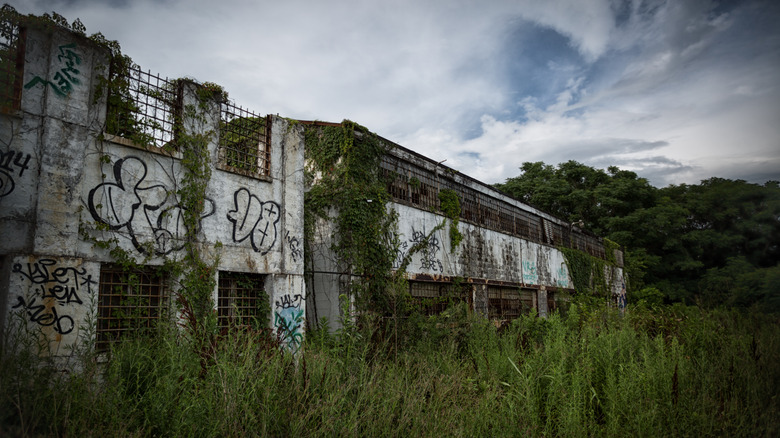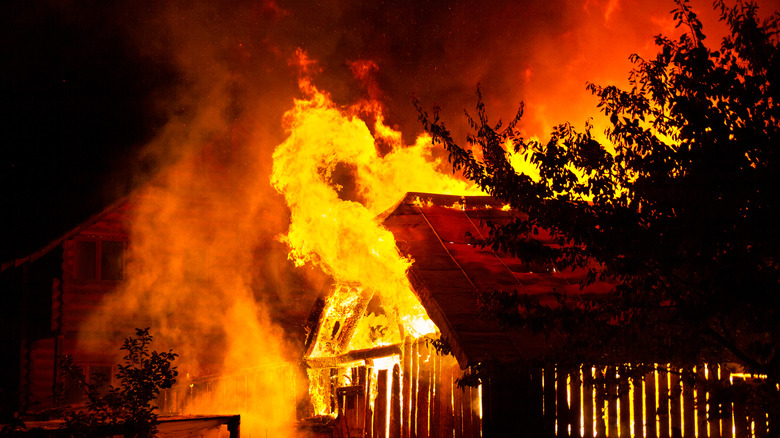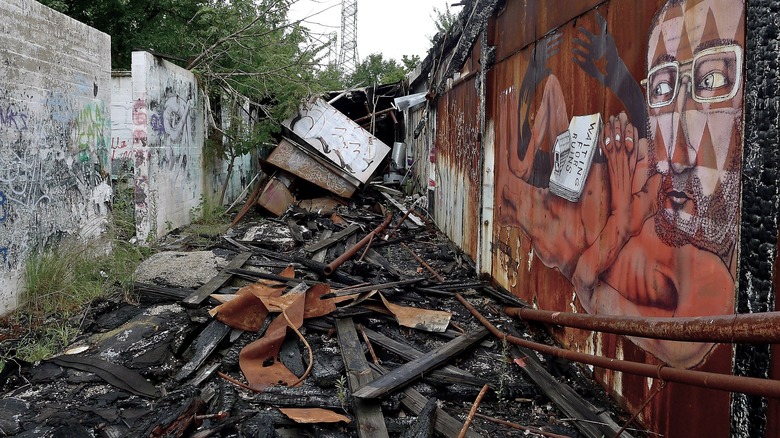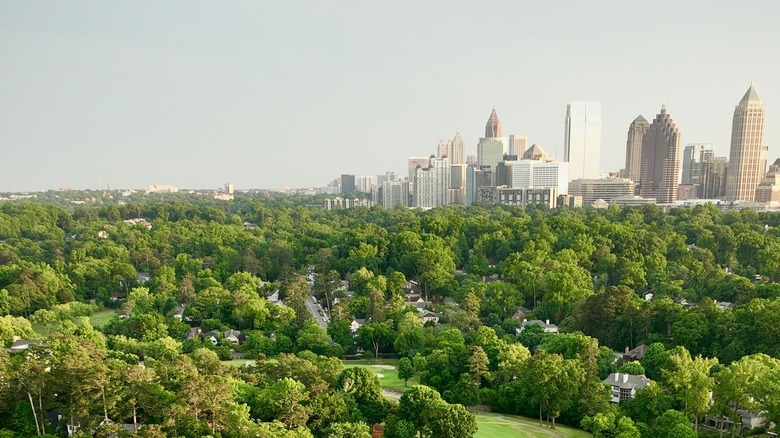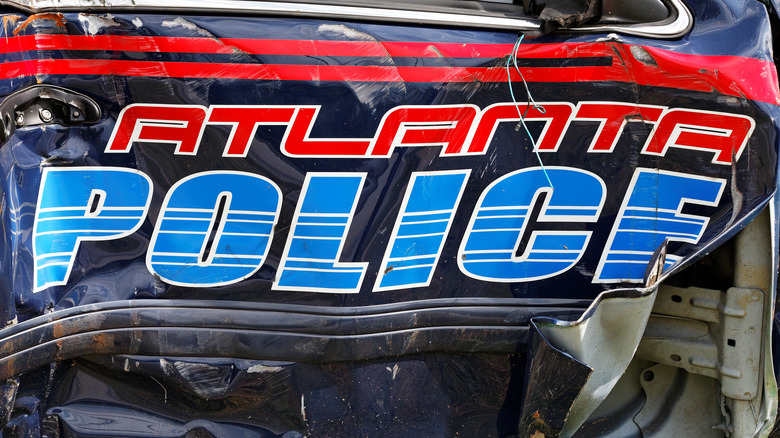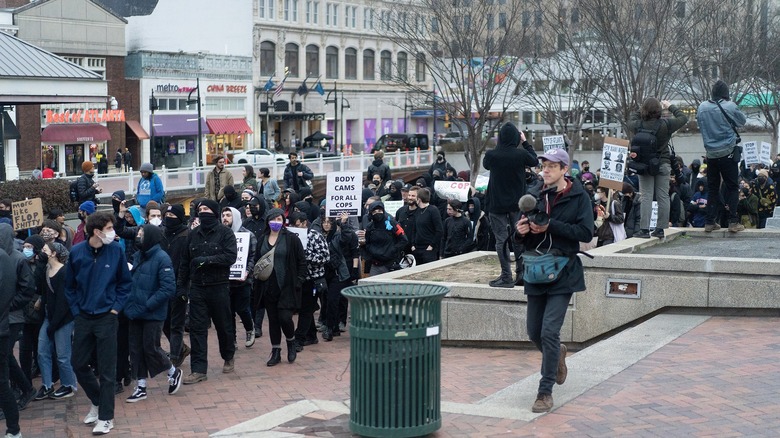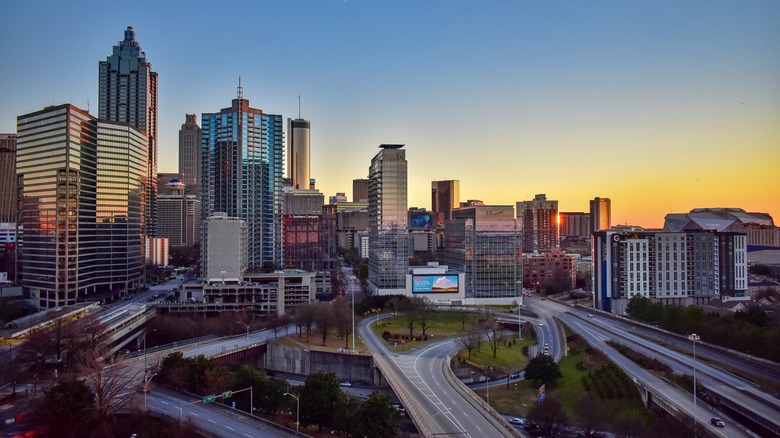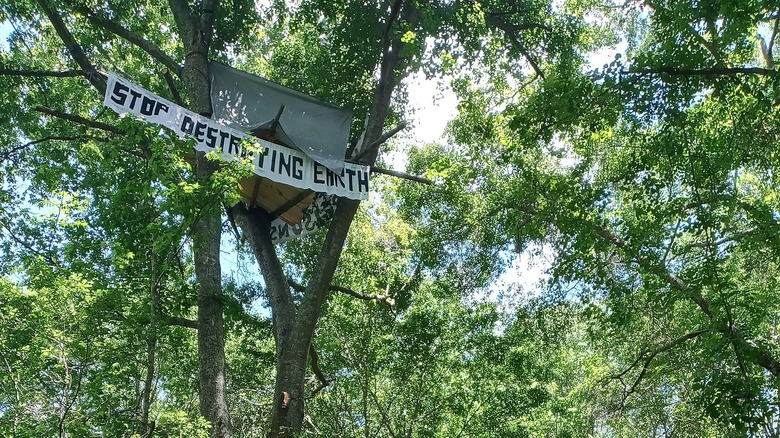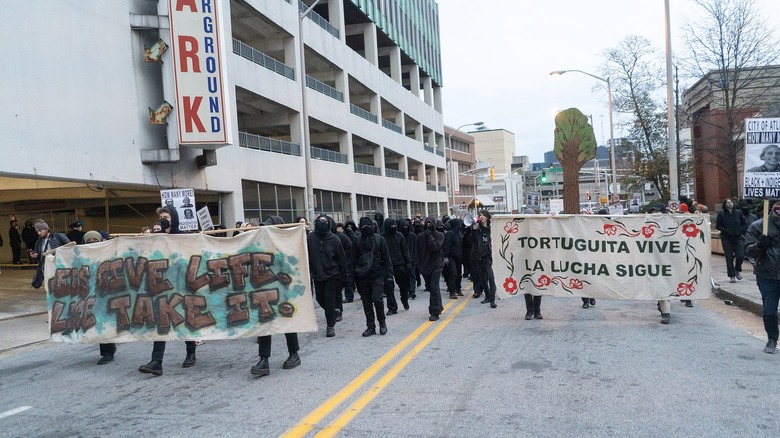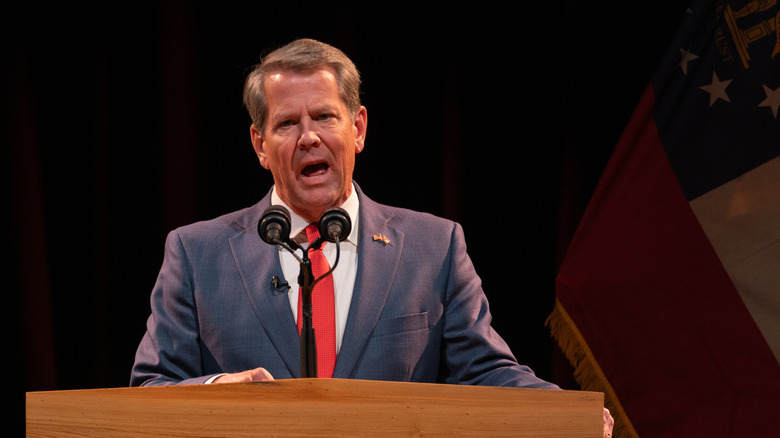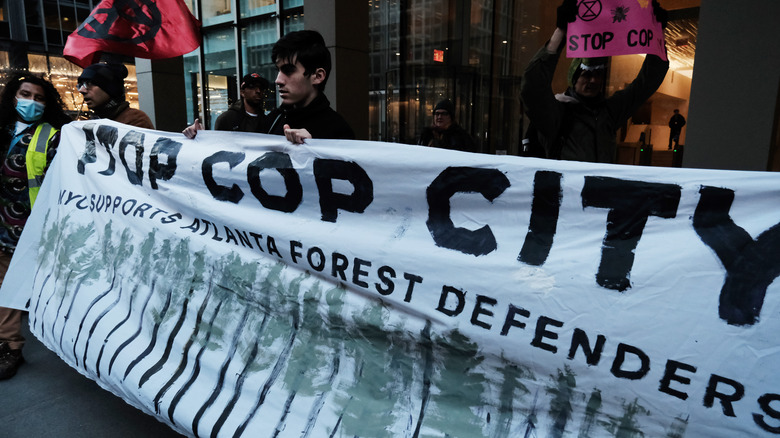What Is Atlanta's Cop City And Why Is It So Controversial?
The city of Atlanta stands out from many others throughout the U.S. because of its extensive canopy of trees, which has led to the adoption of the nickname, "the city in the forest." Therefore, local inhabitants are understandably passionate about the unique environs and hope to preserve the hybrid mix of nature with the urban sprawl. Atlanta also has a long, dark and complicated past dealing with racial segregation and inequality, which has combined in an extremely controversial way when the City Council announced the removal of greenspace to build a state-of-the-art law enforcement facility right next to minority communities.
Shortly after the plans were released to the public in 2021, the infamous training center was dubbed Cop City by its opponents. Since then, the situation has only deteriorated as activists continue to stand against the construction of a place that may make the police more dangerous, while Atlanta authorities have also refused to give in as well. The growing tension has thus exploded in protests, leading to fires, damaged property, charges of domestic terrorism, and most tragically, the death of an activist. Hopefully, the situation does not escalate any further, but the conflict seems far from over.
The dark history of the Old Atlanta Prison Farm
A century before Atlanta began forming the plan to create the notorious Cop City, the proposed site of the new complex was once the location of the Old Atlanta Prison Farm. Following a trend that was spreading throughout the country in the early 1900s, Atlanta established what was essentially a slave labor camp for imprisoned petty criminals forced to do farming work. The area started to function as a prison about 1920 when the city purchased the land outside its limits in the southern DeKalb County and operated until it was permanently shut down around 80 years later in 1995.
Throughout those dark decades, the prisoners endured atrocious conditions on top of the hard labor from the spread of diseases like tuberculosis to an extreme lack of healthcare, and the rampant overcrowding that made the situation even worse. When journalist Dick Herbert went undercover in 1965, he made more equally horrendous discoveries and said, "It was not uncommon to find dead bugs or hair in food. The rusty, dirty tins we drank out of should be replaced" (via The Atlanta Community Press Collective).
Countless stories of deaths and unmarked graves for the many tragic victims have only spread over time, and if true, there is a fear the planned facility will cover up some of the evidence. Local historian Scott Petersen told The Atlanta Journal-Constitution, "There's never been a reckoning about how brutal the prison farm system was on African Americans. I think they better have a really serious look at how police were part of the systematic enforcement of segregation."
Authorities did not care when the Old Atlanta Prison Farm caught fire
After the Old Atlanta Prison Farm closed for good in 1995, the property was almost completely abandoned and left to gradually fall into a state of utter dilapidation. Therefore, the site was already in ruins when the structure caught fire in 2009. Although local firefighters were alerted of the disaster, once they reached the blaze it had already engulfed much of the building's roof, causing significant damage. So, they took the safest route and let the fire eventually burn out.
In the following decade, the problem of igniting flames persisted and by 2017, the local Clark family told 11Alive, "I've seen three different fires now down in that area." They then added in frustration, "The land belongs to the City of Atlanta. Why aren't they paying attention? How does this happen on their own land. If it were my property, and I had that issue, I think the city or county would take me to task. Conversely, it's their property. They should deal with it appropriately."
The abandoned property became an illegal dumping site
Fully neglected and increasingly ravaged by more than one blaze, the Old Atlanta Prison Farm could not be ignored in 2017 when one of the largest fires broke out on the property. The flames grew to such an extent, in fact, that passengers could even see the chaos down below from the windows of planes in the sky. Possibly more disturbing than the fire itself was the toxic material that was feeding it, as Scott Petersen described to 11Alive, "Building material, tires, chemical drums that we don't know what is in there. This amount of contamination hurts the health and vitality of the surrounding community."
Other local residents like Joe Peery were also concerned about how so much hazardous waste had accumulated at the site and why the authorities allowed it to get so bad. Disappointed, he asked The Atlanta Journal-Constitution, "Who else could arrange to have this done in a pretty public place along Key Road where [police are] up and down all day?"
Fortunately, the massive flames caused the city to finally take action and send many trucks to remove 124 tons of debris, including 4,300 tires. DeKalb Fire Department Captain Eric Jackson acknowledged the unlawful activity as well and said, "There's obviously been some illegal dumping of tires over here. That is being addressed. However, it wasn't addressed quick enough prior to this fire."
The Atlanta City Council made secret plans for the area
For once, the city planning department of Atlanta gave DeKalb County residents and environmentalists some hope when word got out that the former Atlanta Prison Farm would be transformed into a huge greenspace preserve. However, those dreams were dashed a few years later in 2021 when the City Council announced the plans for the new training center instead. Jacqueline Echols, the South River Watershed Alliance board president told CNN, "Everybody was floored. Just in 2017 they'd said this would be a park and a community investment."
Echols was far from the only one shocked by the decision, as Atlanta resident and co-manager of the South River Forest Coalition, Allen Doyle, explained to The Atlanta Journal-Constitution, "It was kind of frustrating to be caught so off guard with such a fully laid-out proposal. It just seemed to be like a secret proposal that was suddenly dumped out on the community." Similarly, Katherine Dillard, who lived just down the street from the future facility, added, "We had no idea it was coming. It makes me feel pretty helpless."
Even local government officials were not happy with Atlanta's proposed training center outside of the city limits. DeKalb County Commissioner Ted Terry voiced his complaint and said, "My constituents really don't like the idea, especially because they don't get a say in it."
Atlanta's controversial Public Safety Training Center
In 2021, the Atlanta City Council sparked major controversy once it announced the approval of a plan to build an 85-acre training complex for law enforcement. The new Public Safety Training Center would cost $90 million and would not just have facilities for police instruction, like a firing range, but also areas designated for the fire department as well, including a mock city that could be used by both to simulate real-world challenges, according to the official statement.
The city has also made attempts to incorporate similar aspects to those of the original plan, such as the creation of a 265-acre greenspace, along with 30 acres reserved for urban farming. Mayor Andre Dickens has also stated that throughout this area, there will be a focus to remove invasive species and replace that flora with native hardwood trees, according to USA Today.
But to many residents in the community, along with outside activists, the accommodations were not nearly enough, especially when the earlier ideal scenario would have led to as much as 500 acres for the preserve. Shehza Anjum, Georgia Tech student and leader of the Atlanta branch of the Sunrise Movement environmental organization, gave her perspective to The Atlanta Journal-Constitution and said, "This isn't a sustainable public safety endeavor. There is no investing in communities, and that's what we want them to do, we want City Council to divest resources from policing."
Activists immediately got heavily involved
Once the public became aware of the plan to build the notorious training center, it did not take long for opposition to arise, which then intensified greatly after the Atlanta City Council gave its authorization for the project to proceed. Just days later in August 2021, a coalition of environmental groups, including the Sierra Club, released a statement strongly condemning the construction project for the disastrous effects it would have on the local environment.
The multiple organizations argued that to combat the effects of climate change, the best option for neighboring communities was to keep the entire area heavily forested. Not only would this help prevent extreme temperatures from the urban heat island effect, but also decrease the chances of severe flooding in the future. One more environmental concern that has been voiced is the potential for lead poisoning from the exorbitant amount of spent ammo at the future firing range, as reported by The Atlanta Journal-Constitution.
Local activist groups, such as the Defend the Atlanta Forest Movement, had other major issues with the proposed complex as well, from the strong rejection of any attempts to militarize the police to the very little interest that has been shown in considering the needs of local residents. Since these communities are mostly comprised of African American and Hispanic minorities, the fight to gain as much greenspace as possible is critical because parks are so sparse in the other areas of the city that they live in. But words and marches were not enough for many protestors, and in the following months, they began to camp in the nearby trees to stop the construction from ever starting.
The plan has support in Atlanta
While the infamous Cop City has faced strong opposition from activist groups and local residents, there are those in Atlanta especially who are in support of the comprehensive training facility. If the Atlanta Police Foundation CEO and President, Dave Wilkinson, is correct, people in the city may see it way to make it a safer place. He told The Atlanta Journal-Constitution, "People are scared to death of this crime surge. We have a plan in place now to get past this, but building this public safety training center is the key, the big symbolic thing that shows we're behind police and fire."
When local resident Spence Gould was asked about the new law enforcement complex by CNN, he admitted to having mixed feelings. He said, "I want my police force very well-trained, I want them to have all the resources that they need. But I also see the [Defend the Atlanta Forest] concerns because we are really wrecking the planet."
Members of the business community have been some of the strongest supporters of the training center, which somewhat controversially includes Alex Taylor. While Taylor was in charge of the initial private funding campaign, he is also the Chairman and CEO of Cox Enterprises, which owns The Atlanta Journal-Constitution. The connection was enough for CNN to reach out and inquire about it, to which spokeswoman Sonji Jacobs replied that the newspaper not only disclosed that it is owned by Cox Enterprises on several occasions, but stressed that the outlet always operates with total editorial independence as well.
The first arrests for domestic terrorism
In December 2022, law enforcement officials no longer tolerated attempts to block road access to the construction site of Cop City, so in the process of removing barricades, agents attempted to clear away some of the activists' camp as well. The confrontation between the two groups then turned violent, as the Georgia Bureau of Investigation explained, "Several people threw rocks at police cars and attacked EMT's outside the neighboring fire stations with rocks and bottles. Task force members used various tactics to arrest individuals who were occupying makeshift treehouses" (via CNN).
In the end, five protestors were arrested and all received one of the harshest charges possible, domestic terrorism. A thorough search of the premises also uncovered explosive devices, gasoline, and road flares. Along with the dangerous face off and retrieved, potentially lethal collection, the charges were also the result of a series of previous incidents with the activists, including arson and the destruction of property.
After the five individuals were taken into custody, Georgia Governor Brian Kemp released a statement in support of the action and said, "We will not stop or slow down when it comes to bringing domestic terrorists to justice in Georgia, and yesterday's arrests should serve as a strong reminder of that to anyone threatening our communities."
The fatal shooting of Manuel Esteban Paez Teran
In January 2023, an event far worse than the arrests occurred outside the Cop City site when protestor Manuel Esteban Paez Terán was fatally shot 13 times. It was alleged they were disobeying commands and fired upon law enforcement first. The Paez family doubted the explanation and were not only horrified to hear of what had happened to Manuel, affectionately known as Tortuguita, but were beyond frustrated with the lack of information coming from the authorities.
In heartbreaking desperation, Tortuguita's mother, Belkis Teran, said in a statement, "Imagine the police killed your child. And now then imagine they won't tell you anything. That is what we are going through" (via NPR). The situation became more difficult for the Paez family after an autopsy in March concluded that the victim was likely sitting cross-legged with their hands up when fired upon. Dekalb County released Tortuguita's official autopsy in April, which concluded that the victim had no gunpowder residue on their hands and was actually shot over 50 times (via ABC).
The same tragic day that Tortuguita was shot, at least seven other individuals were also arrested and charged as domestic terrorists as well. In response to Tortuguita's death and the arrests, the Paez family attorney, Jeff Filipovits, said, "The terrorism charges are meant to send a message, and that message is clear: 'If you stand in our way, we will take you out of our way'" (via The Guardian). On the other hand, police chief Darin Schierbaum had a different perspective and said in a press conference, "It doesn't take a rocket scientist or an attorney to tell you that breaking windows and setting fires is not protest. It's terrorism."
Georgia Governor Brian Kemp declared a state of emergency
The shooting of Manuel Esteban Paez Teran dramatically escalated the already tense situation between the protestors and the authorities. Just a week after the tragic incident, Georgia Governor Brian Kemp took the extreme measure of declaring a state of emergency to receive significant support from the National Guard. In response to activists using fireworks and rocks against the Atlanta Police Foundation, while also burning two cop cars and damaging three businesses, the governor felt it was necessary to bring in 1,000 of the state's troops held in reserve.
It was not the first time Kemp had resorted to such a drastic action, having done so after the death of George Floyd in 2020 as well. He defended that decision, along with the more recent one, and said, "[The National Guard] may be necessary to avert the threatened danger and to maintain peace and good order in the particular circumstances."
On the other hand, the activist organizations opposing Cop City were not deterred by the governor's declaration and remained defiant. The Atlanta Solidarity Fund that has provided legal support to the protestors told the Rolling Stone, "We know that Georgia Police regularly and consistently lie about the conditions under which they shoot and kill people, and that the 'facts' will frequently change to justify police action, no matter how murderous or egregious. No matter what they do, police will always claim to be the actual victims."
23 more protestors were arrested as domestic terrorists
In March 2023, dozens of protestors wearing black masks assaulted the Cop City construction site and utilized several strategies to do so that alarmed the officers stationed there. Not only did law enforcement accuse the activists of throwing Molotov cocktails, bricks, and other projectiles against them, but the police also reported the use of debris to block access by road and lasers to temporarily blind their vision. Video footage was also provided as evidence especially for the fire damage caused done to construction equipment.
The police took the activists' actions very seriously and Atlanta Chief Darin Schierbaum called it a coordinated attack. Throughout the chaotic confrontation, 23 arrests were made and every one of them were given the serious charge of domestic terrorism, as reported by the Associated Press. While already a significant punishment, it may become even harsher as legislators have indicated a willingness to make it a violent felony that would force those convicted to remain behind bars for at least 30 years before they have any chance of parole.
